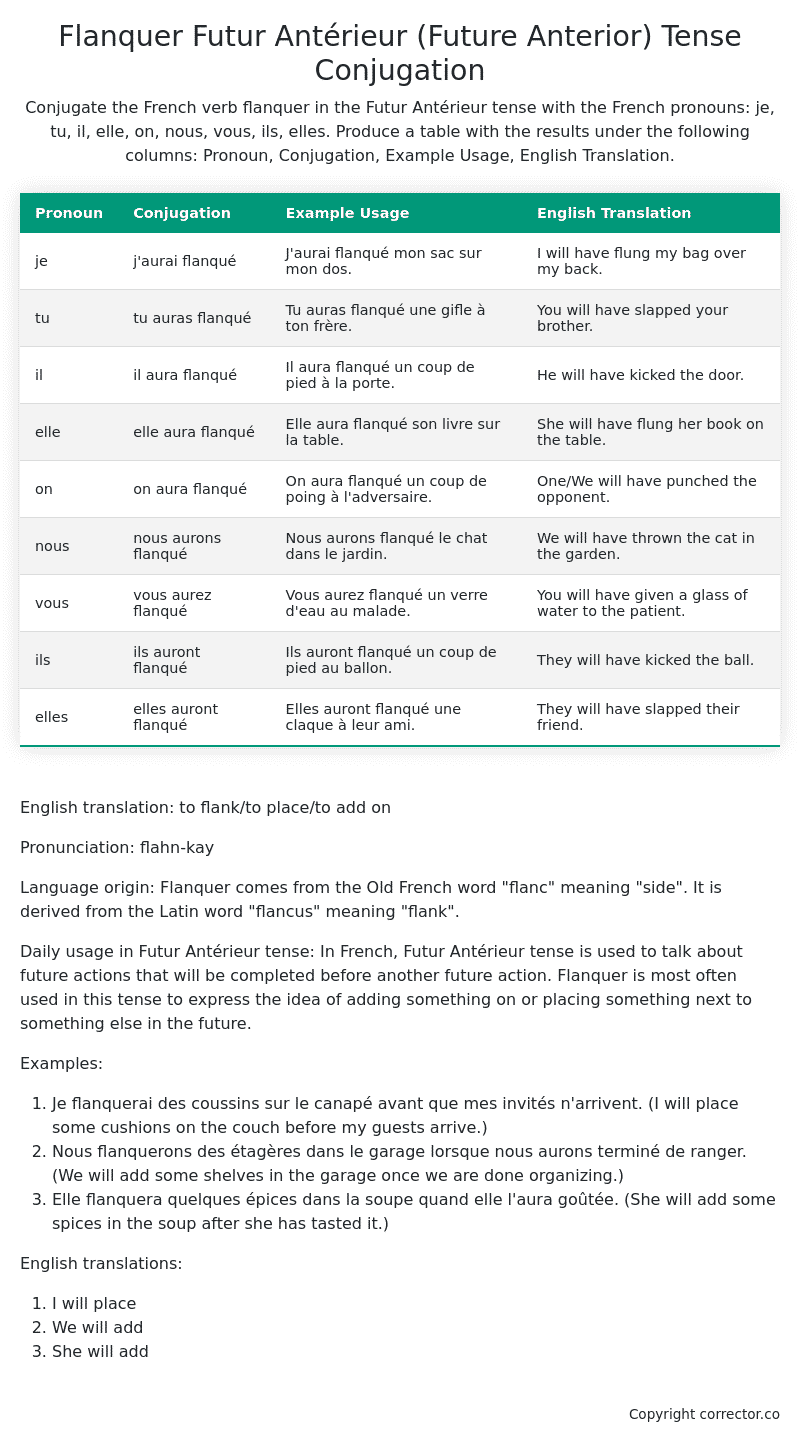Futur Antérieur (Future Anterior) Tense Conjugation of the French Verb flanquer
Introduction to the verb flanquer
English translation: to flank/to place/to add on
Pronunciation: flahn-kay
Language origin: Flanquer comes from the Old French word “flanc” meaning “side”. It is derived from the Latin word “flancus” meaning “flank”.
Daily usage in Futur Antérieur tense: In French, Futur Antérieur tense is used to talk about future actions that will be completed before another future action. Flanquer is most often used in this tense to express the idea of adding something on or placing something next to something else in the future.
Examples:
- Je flanquerai des coussins sur le canapé avant que mes invités n’arrivent. (I will place some cushions on the couch before my guests arrive.)
- Nous flanquerons des étagères dans le garage lorsque nous aurons terminé de ranger. (We will add some shelves in the garage once we are done organizing.)
- Elle flanquera quelques épices dans la soupe quand elle l’aura goûtée. (She will add some spices in the soup after she has tasted it.)
English translations:
- I will place
- We will add
- She will add
Table of the Futur Antérieur (Future Anterior) Tense Conjugation of flanquer
Conjugate the French verb flanquer in the Futur Antérieur tense with the French pronouns: je, tu, il, elle, on, nous, vous, ils, elles. Produce a table with the results under the following columns: Pronoun, Conjugation, Example Usage, English Translation.
| Pronoun | Conjugation | Example Usage | English Translation |
|---|---|---|---|
| je | j’aurai flanqué | J’aurai flanqué mon sac sur mon dos. | I will have flung my bag over my back. |
| tu | tu auras flanqué | Tu auras flanqué une gifle à ton frère. | You will have slapped your brother. |
| il | il aura flanqué | Il aura flanqué un coup de pied à la porte. | He will have kicked the door. |
| elle | elle aura flanqué | Elle aura flanqué son livre sur la table. | She will have flung her book on the table. |
| on | on aura flanqué | On aura flanqué un coup de poing à l’adversaire. | One/We will have punched the opponent. |
| nous | nous aurons flanqué | Nous aurons flanqué le chat dans le jardin. | We will have thrown the cat in the garden. |
| vous | vous aurez flanqué | Vous aurez flanqué un verre d’eau au malade. | You will have given a glass of water to the patient. |
| ils | ils auront flanqué | Ils auront flanqué un coup de pied au ballon. | They will have kicked the ball. |
| elles | elles auront flanqué | Elles auront flanqué une claque à leur ami. | They will have slapped their friend. |
Other Conjugations for Flanquer.
Le Present (Present Tense) Conjugation of the French Verb flanquer
Imparfait (Imperfect) Tense Conjugation of the French Verb flanquer
Passé Simple (Simple Past) Tense Conjugation of the French Verb flanquer
Passé Composé (Present Perfect) Tense Conjugation of the French Verb flanquer
Futur Simple (Simple Future) Tense Conjugation of the French Verb flanquer
Futur Proche (Near Future) Tense Conjugation of the French Verb flanquer
Plus-que-parfait (Pluperfect) Tense Conjugation of the French Verb flanquer
Passé Antérieur (Past Anterior) Tense Conjugation of the French Verb flanquer
Futur Antérieur (Future Anterior) Tense Conjugation of the French Verb flanquer (this article)
Subjonctif Présent (Subjunctive Present) Tense Conjugation of the French Verb flanquer
Subjonctif Passé (Subjunctive Past) Tense Conjugation of the French Verb flanquer
Subjonctif Imparfait (Subjunctive Imperfect) Tense Conjugation of the French Verb flanquer
Subjonctif Plus-que-parfait (Subjunctive Pluperfect) Tense Conjugation of the French Verb flanquer
Conditionnel Présent (Conditional Present) Tense Conjugation of the French Verb flanquer
Conditionnel Passé (Conditional Past) Tense Conjugation of the French Verb flanquer
L’impératif Présent (Imperative Present) Tense Conjugation of the French Verb flanquer
L’infinitif Présent (Infinitive Present) Tense Conjugation of the French Verb flanquer
Struggling with French verbs or the language in general? Why not use our free French Grammar Checker – no registration required!
Get a FREE Download Study Sheet of this Conjugation 🔥
Simply right click the image below, click “save image” and get your free reference for the flanquer Futur Antérieur tense conjugation!

Flanquer – About the French Futur Antérieur (Future Anterior) Tense
Construction
Common Everyday Usage Patterns
Interactions with Other Tenses
For example
Summary
I hope you enjoyed this article on the verb flanquer. Still in a learning mood? Check out another TOTALLY random French verb conjugation!


